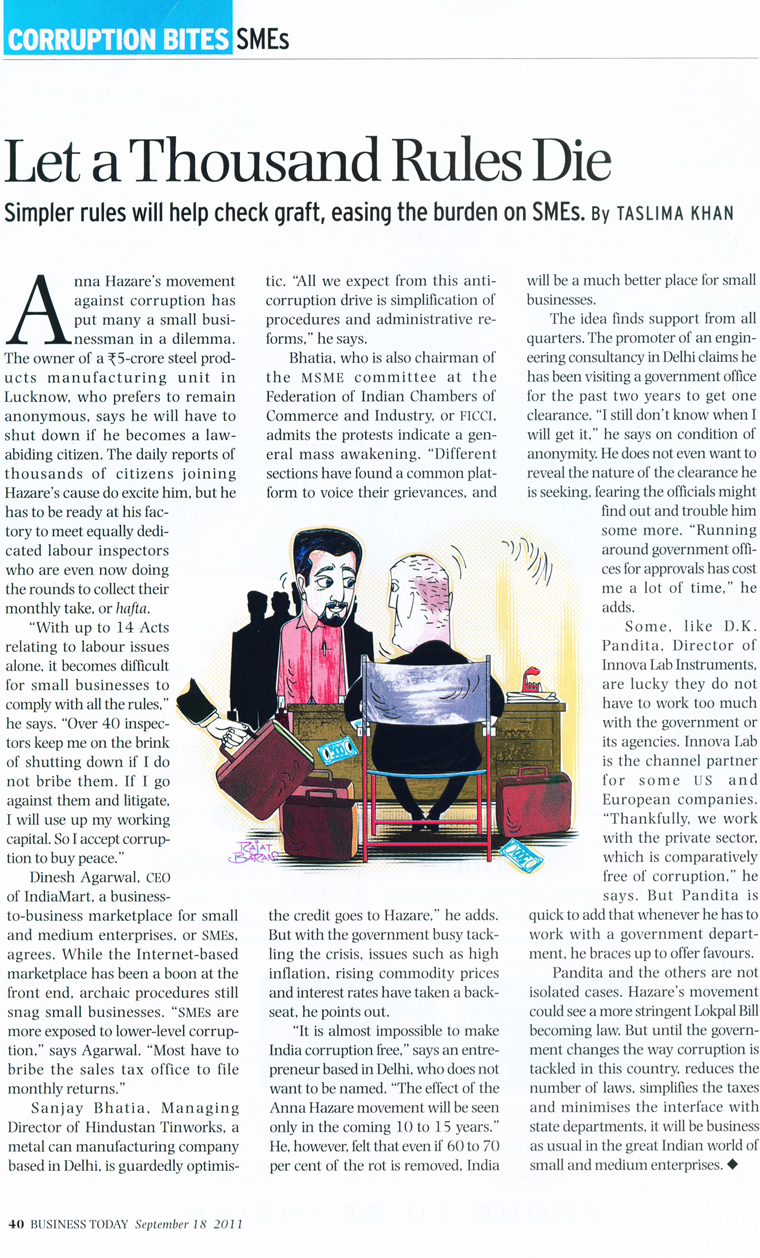Business Today,

Simpler rules will help check graft, easing the burden of SMEs. By Taslima Khan
Anna Hazare’s movement against corruption has put many a small businessman in a dilemma. The owner of a Rs. 5 crore steel products manufacturing unit in Lucknow, who prefers to remain anonymous, says he will have to shut down if he becomes a lawabiding citizen. The daily reports of thousands of citizens joining Hazare’s cause do excite him, but he has to be ready at his factory to meet equally dedicated labour inspectors who are even now doing the rounds to collect their monthly take or hafta.
“With up to 14 Acts relating to labour issues alone, it becomes difficult for small businesses to comply with all the rules,” he says. “Over 40 inspectors keep me on th brink of shutting down if I do not bride them. If I go against them and ligigate, I will use up my working capital, So I accept corruption to buy peace.”
Dinesh Agarwal, CEO of IndiaMART, a business-to-business marketplace for small and medium enterprises, or SMEs, agrees. While the Internet-based marketplace has been a boon at the front end, archaic procedures still snag small businesses. “SMEs are more exposed to lower-level corruption,” says Agarwal. “Most have to bribe the sales tax office to file monthly returns.”
Sanjay Bhatia, Managing Director of Hindustan Tinworks, a metal can manufacturing company base in Delhi, is guardedly optimistic. “All we expect from this anti corruption drive is simplification of procedures and administrative reforms.” he says.
Bhatia who is also chairman of the MSME committee at the Federation of Indian Chambers of Commerce and Industry, of FICCI, admits the protests indicate a general mass awakening. “Different sections have found a common platform to voice their grievances, and the credit goes to Hazare,” he adds. But with the government busy tackling the crisis, issues such as high inflation, rising commodity prices and interest rates have taken a back seat, he point out.
“It is almost impossible to make India corruption free,” says an entrepreneur based in Delhi, who does not want to be named. “The effect of the Anna Hazare movement will be seen only in the coming 10 to 15 years.” He, however, felt that even if 60 to 70 percent of the rot is removed, India will be much better place for small businesses.
The idea finds support from all quarters. The promoter of an engineering consultancy in Delhi claims he has been visiting a government office for the past two years to get one clearance. “I still don’t know when I will get it,” he says on condition of anonymity. He does not even want to reveal the nature of the clearance he is seeking. Fearing the officials might find out and trouble him some more. “ Running around government offices for approvals has cost me a lot of time,” he adds.
Some, like D.K. Pandita, Director of Innova lab Instruments, are lucky they do not have to work too much with the government or its agencies. Innova Lab is the channel partner for some US and European companies. “Thankfully, we work with the private sector, which is comparatively free of corruption,” he says. But Pandita is quick to add that whenever he has to work with a government department he braces us to offer favours.
Pandita and the others are not isolated cases. Hazare’s movement could see a more stringent Lokpal Bill becoming law. But until the government changes the way corruption is tackled in this country, reduces the number of laws, simplifies the taxes and minimises the interface with state departments, it will be business as usual in the great Indian world of small and medium enterprises.

